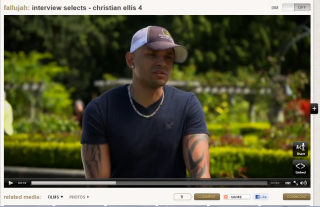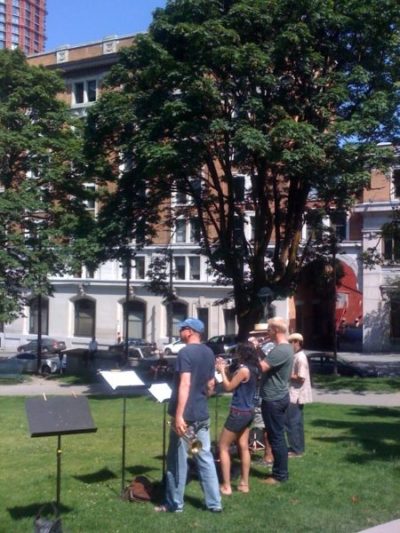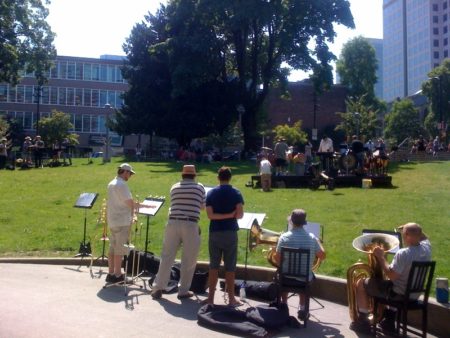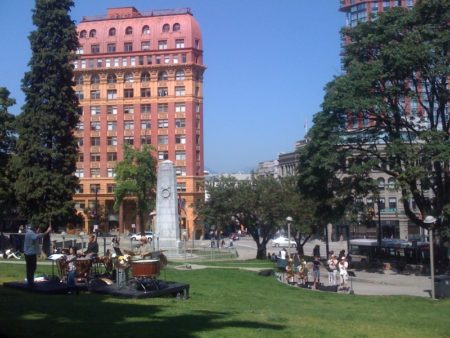Music in the City and the Psyche

Christian Ellis interview on the Explore.org website
Update: 28 August 2012
The editors at Harpers have assigned the story. So this piece will be appearing in an upcoming issue of that great magazine. We’re very much interested in the story of PTSD and how it is illuminated by Christian Ellis’s story and the remarkable opera inspired by his experiences. That’s both sides of the story: what makes battlefields ever more virulent breed grounds for the types of trauma that induce the syndrome, but also what cultural evolutions in contemporary civilian life contribute to the problem when the vets return home.
It’s a thorny issue. And some recent online posts I made about PTSD prove that feelings are very strong on the topic. It touches more people than I realized. But that only makes the potential for this article greater, and I’m glad to be working on it.
Thanks to Jeremy Keehn at Harpers for the assignment. Great to be working with him again.
—
I had coffee with a fimmaker friend John Bolton recently, who’d been hired to video a remarkable event: the Vancouver City Opera’s full rehearsal of an opera based on the combat and post-war experiences of gay former Marine Seargent Christian Ellis.
The opera, called Fallujah, isn’t remarkable because Ellis is gay or even because he was a Marine. It’s remarkable because, in writing this work, Iraqi/American Heather Raffo and Canadian composer Tobin Stokes (with crucial support of Charles Annenberg and his Explore.org foundation) have done something that nobody has previously. They’ve written a musical work about the Iraq War and what is arguably its most deadly inheritance: Post Trauma Stress Disorder (PTSD).
PTSD is a huge and increasing problem for nations engaged in modern conflict. Read “A Veteran’s Death, A Nation’s Shame“, written by Nicholas Kristoff in the New York times earlier this year, and you may be horrified to learn that there will be a suicide by a veteran every 80 minutes in 2012. Yes, you read that correctly. 25 times the death rate of soldiers in actual conflict.
I mention this story because I’m developing a magazine feature about Ellis. And I’ll say more on that project, hopefully, as weeks go by.
But in the meantime, I wanted to mention how – just after a recent discussion with a friend about Ellis and his story – I found myself sitting at my desk, trying to get my mind back on other assignments, and I had the strangest sensation.
I thought I could hear music.

Of course, I laughed at myself, thinking this was a brain image carried over from my conversation, something that Ellis’ story had somehow burned onto my imagination.
After a moment or two however, the auditory reality of what I was hearing could not be denied. Somebody, somewhere, was playing a brassy, orchestral tune, that was dancing along the light Vancouver breeze, from somewhere down on the streets, and was wafting up in strands and disconnected phrases to me, at my computer, in my office overlooking the city.

I went downstairs to investigate.
And it turned out: I hadn’t imagined the sound. In Victory Square there were a dozen plus horn players, a couple of percussionists and a conducter. And they were rolling through an improvisational jazz number that I learned later was the work of long time Vancouver jazz player Brad Muirhead.
The piece is called “What’s the Idea?”

So beautiful. I was glad to be there, glad to be alive.
Thanks Brad Muirhead. And if you want to hear it yourself, the show rolls again Tuesday July 10th at noon, and again on Thursday July 12th at 5pm.
What’s the Idea? Here I’ll go all romantic on you: the idea is music in the city, in the psyche, in the wind, in the heart.
